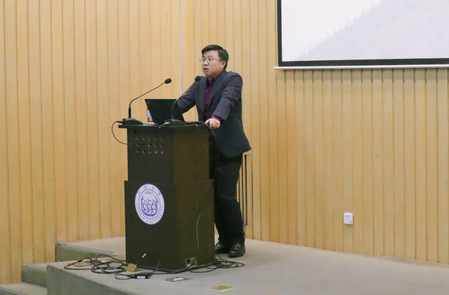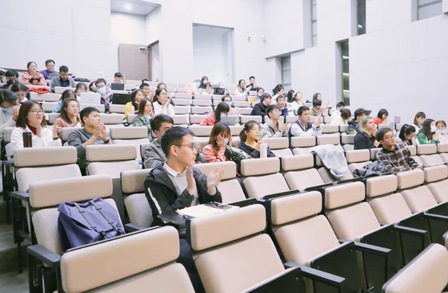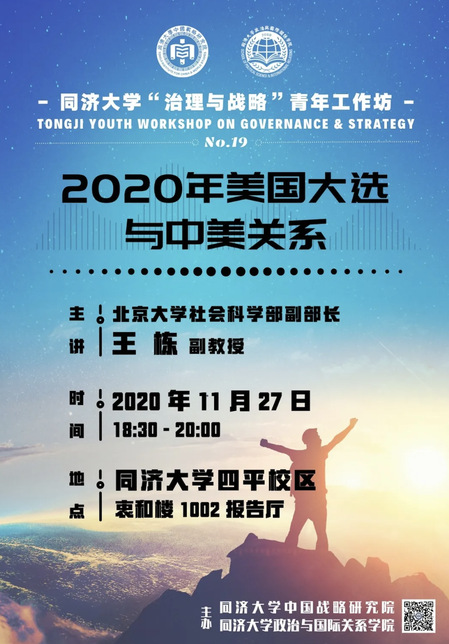News



Hosted by the Institute for China & World Studies and the School of Political Science & International Relations (SPSIR) of Tongji University, the Tongji Youth Workshop on Governance & Strategy No.19 was successfully held in the lecture hall on the 10th floor of Zhonghe Building, Siping campus on November 27, 2020. Associate Professor Wang Dong, Deputy Director of the Office for Humanities and Social Sciences and Executive Director of the Institute for Global Cooperation and Understanding (iGCU), Peking University, was invited to share his personal research findings with more than 50 Tongji teachers and students around the theme of “US Election 2020 and China-US Relations”, and exchanged ideas with the young teachers and graduate students attending the workshop. This workshop was moderated by Associate Professor Zhong Zhenming, Associate Dean and Head of the Department of International Relations of SPSIR.

Associate Professor Wang first analyzed the US presidential election in 2020 and the Electoral College system, believing that this election was a ruling on Trump rather than the Trumpism, and the division and polarization of the US is getting worse. According to his study, due to the impact of Black Swan events such as the COVID-19 pandemic and the Black Lives Matter (BLM) movement, exit polls will no longer be a reliable indicator of the election. Based on the above, he focused on the China-US relations in the context of major changes unseen in a century. He believed that the US debate around its policy towards China has undergone three stages of changes since 2008, and the US has shifted gears towards a comprehensive strategic competition with China. Looking ahead, although the Biden administration may adopt limited competition with China, we still need to be vigilant and respond to the joint pressure on China by the US and other Western countries. In his sharing, he pointed out that we need to build a China-US “new engagement consensus” in the next 5-10 years, and shape the bilateral ties in the spirit of no conflict, no confrontation, mutual respect, and win-win cooperation. To this end, China should, through further reform and a higher degree of all-round opening up, get deeply involved in the international division of labor, and lead the process of re-globalization in an all-round way, so as to link China to the rest of the world more closely.
Based on his long-term research interest and continuous participation in China-US people-to-people exchanges, Associate Professor Wang introduced the basic situation of the US election 2020 to Tongji teachers and students, and carefully analyzed the historical traditions and political logic, providing a useful reference for everyone to understand the American politics and China-US relations. He also emphasized the important role of universities and their teachers and students in foreign exchanges through the introduction of people-to-people exchanges between China and other countries, which was also well received by the teachers and students present.

In the Q&A session, young teachers at the Department of International Relations and the Department of Diplomacy as well as doctoral and master students of the school raised questions on the US election and the prospective changes in China-US relations. Associate Professor Wang gave a wonderful response based on his rich experience and deep understanding of American politics.
At the end of the event, Associate Dean Zhong Zhenming expressed his gratitude to Associate Professor Wang Dong and the teachers and students of Tongji present who were believed to learn much about American politics and China-US relations from the workshop. He mentioned that Associate Professor Wang’s insightful views are of great significance for understanding the China-US relations in the new era and the US foreign policy after Biden came to power. Also, he looked forward to Wang’s visit to Tongji again for academic exchange.
